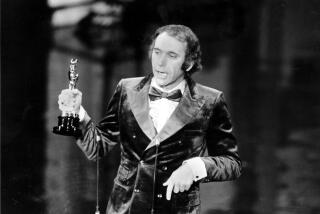The Contenders: Michael Pitt’s new passion project
Michael Pitt arrives from a film set in Seattle dressed all in black, from his hat to his unlaced black army boots, and asks to sit outside so he can smoke and be in the California sunshine — an antidote to the nonstop rain he’s been working in.
The actor is in the midst of a new passion project — a movie called “You Can’t Win,” based on a 1926 memoir by Jack Black, a freight-hopping hobo, thief and adventurer whose canny assessment of how the game of life is rigged was cited as a major influence by Beat generation icon William S. Burroughs.
Pitt co-wrote the movie and is co-producing it, as well as starring in it. He’s moved on, in other words, from HBO’s”Boardwalk Empire,” in which his character, the young mobster protégé Jimmy Darmody, was left lying dead in the rain with a bullet through his head at the end of Season 2.
Many fans expressed shock and outrage at Jimmy’s fate. He had become, in many ways, the tortured soul of the series as well as a wayward surrogate son to mentor Nucky Thompson (Steve Buscemi), the Atlantic City crime boss who ended up killing him. The day the end came for Jimmy on the set, “I felt like I was cheering everyone else up,” says the slender, cherub-faced actor, who is thoughtful and soft-spoken in person. “I should have been the one who needed cheering up. The crew and the actors — some people cried,” he marvels. “It was heavy. People really identify with these shows.”
Certainly, Jimmy was a magnetic character. Both callous and caring, he came limping back from World War I to return to his wife and child and get what he had coming to him as the bastard son of Atlantic City’s wealthy original crime boss (Dabney Coleman). Underestimated at first, he fought his way to power only to find that holding on to his gains meant ordering the death of his own mentor (Buscemi). That scene, in which Jimmy hesitates with all eyes upon him, then gruffly calls for the act to be done, is one of the actor’s best, but it also sealed his character’s fate.
“I’m surprised that viewers were surprised when Jimmy died because it was all there,” he says. “He’s going to try to kill the main character, Nucky? They’re not going to let that happen.”
The real key to Jimmy’s haunted nature is revealed in Season 2’s penultimate episode — in a flashback, his own mother seduces him one drunken night. Destroyed, Jimmy drops out of Princeton and enlists as a soldier, only to face more soul-destroying hell in the foxholes of France.
“I died a long time ago in a trench — I thought you knew that,” he says, right before Nucky pulls the trigger on him. As strong as those scenes are, Pitt says an even better one was left on the cutting room floor. It involved an exchange between Jimmy and Al Capone (Stephen Graham) while Jimmy burns the clothes of his recently murdered wife. “He was grieving, and letting go, but he was also letting go of his fight with the world,” says Pitt. “That’s why he went to that final meeting with Nucky unarmed. But they cut the scene because they felt it gave too much away.”
Pitt says he immersed himself in research about WWI and the Prohibition era for nearly two years. “I needed to know what the world looked like to that character and also psychoanalyze him and know his function in the plot. If people connected with that character, I think it’s because I did that work.”
Before “Boardwalk,” Pitt worked mostly in adventurous art house films by directors such as Gus Van Sant (“Last Days”), Michael Haneke (“Funny Games”) and Bernardo Bertolucci (“The Dreamers).”
“ ‘Boardwalk’ has kind of exposed me to a different demographic,” says Pitt. “And it upped my skills in terms of the speed with which I can prep a scene, and I’m excited to apply that.”
But getting to work with Martin Scorsese, who directed the “Boardwalk Empire” pilot, trumped everything. “He has such a pure respect for filmmaking. He respected the choices I’ve made and the directors I’ve worked with. That was very positive, to be noticed like that.
“I didn’t want to like Scorsese this much, because I was worried that I’d just want to work with him all the time. And I do,” he says with a laugh. “I just want to work with him all the time.”
More to Read
The biggest entertainment stories
Get our big stories about Hollywood, film, television, music, arts, culture and more right in your inbox as soon as they publish.
You may occasionally receive promotional content from the Los Angeles Times.










